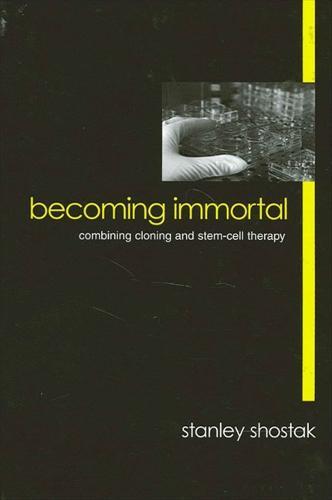Overview
Explores how new organs might be engineered via cloning and reproductive technology to achieve human immortality.
Full Product Details
Author: Stanley Shostak
Publisher: State University of New York Press
Imprint: State University of New York Press
Dimensions:
Width: 15.20cm
, Height: 2.50cm
, Length: 22.90cm
Weight: 0.435kg
ISBN: 9780791454022
ISBN 10: 0791454029
Pages: 322
Publication Date: 11 April 2002
Audience:
College/higher education
,
General/trade
,
Undergraduate
,
Postgraduate, Research & Scholarly
Format: Paperback
Publisher's Status: Active
Availability: In Print

This item will be ordered in for you from one of our suppliers. Upon receipt, we will promptly dispatch it out to you. For in store availability, please contact us.
Reviews
...provides an interesting context for considering a wide range of moral and policy issues that have been raised in previous debates on biomedical technologies. - Science This is a bold and imaginative attempt to open up discussion on several levels-biological and ethical-about a possible development in human evolution, notably, that of our becoming immortal. Shostak lucidly and instructively explains why it is that complex cellular life has evolved in a mortal fashion and how developments in biotechnology and increases in our understanding of life will, at some point in the future, enable us to create immortal human beings. - Keith Ansell-Pearson, University of Warwick The author has a very interesting and compelling argument for immortality, whereby the provocative implication of this book is that, far from being a pipe-dream, human immortality is a biological possibility. It's a very informative presentation of the pertinent biology and history of biology, with some reference to the larger ethical and political implications of the subject. - Robert M. Johnson, Castleton College
"""...provides an interesting context for considering a wide range of moral and policy issues that have been raised in previous debates on biomedical technologies."" - Science ""This is a bold and imaginative attempt to open up discussion on several levels-biological and ethical-about a possible development in human evolution, notably, that of our becoming immortal. Shostak lucidly and instructively explains why it is that complex cellular life has evolved in a mortal fashion and how developments in biotechnology and increases in our understanding of life will, at some point in the future, enable us to create immortal human beings."" - Keith Ansell-Pearson, University of Warwick ""The author has a very interesting and compelling argument for immortality, whereby the provocative implication of this book is that, far from being a pipe-dream, human immortality is a biological possibility. It's a very informative presentation of the pertinent biology and history of biology, with some reference to the larger ethical and political implications of the subject."" - Robert M. Johnson, Castleton College"
Author Information
Stanley Shostak is Associate Professor of Biological Sciences at the University of Pittsburgh. He is the author of Embryology: An Introduction to Developmental Biology; Death of Life: The Legacy of Molecular Biology; and Evolution of Sameness and Difference: Perspectives on the Human Genome Project.




